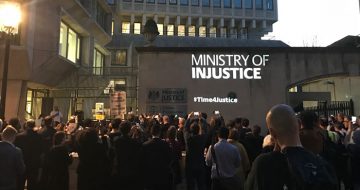Executive Committee met this week and considered recommending escalation of the action

The number of chambers refusing new work in protest against the government’s cuts to legal aid has hit three figures.
Nationally, there are now 100 chambers involved in the quasi-strike action. Big names including Carmelite, Doughty Street, Furnival, Garden Court, Lamb Building and Matrix are on the list. Outside of London and supporting the cause are the likes of 1 High Pavement (Nottingham), 9 Park Place (Cardiff), 12 College Place (Southampton) and Linenhall Chambers (Chester).
In March, members of the Criminal Bar Association (CBA) voted overwhelmingly in favour of refusing new publicly-funded cases from 1 April. This walkout is in response to the government’s changes to the Advocates’ Graduated Fee Scheme (AGFS), which it’s understood will result in further cuts to legal aid lawyers’ income. Government spending on legal aid has fallen by more than £1 billion since 2005.
Angela Rafferty, chair of the CBA, said:
“We remind the government that no barrister wants to take this action. Our repeated calls for a principled and practical solution stand. Justice should be placed in its rightful place. Investment across the system is required.”
She also told us “the Executive Committee met this week and considered recommending escalation of the action”, but provided no further information about this.
Because of this action, suspected murderers have now appeared in court without barristers. For example, the Old Bailey hearing for Kema Salum, who stands accused of killing his wife, was delayed because no barrister was there to present his defence. His solicitor, Seona White from BSB Solicitors, told the court she couldn’t find anyone to represent Salum, despite having contacted more than 20 chambers.
Jonathan Black, a partner at BSB Solicitors, said at a recent panel event that further chaos is to be expected as non-murder cases filter through the magistrates’ court system and to the crown courts.
The budget for justice is forecast to fall by £600 million in next two years, from £6.6 billion to £6 billion.


